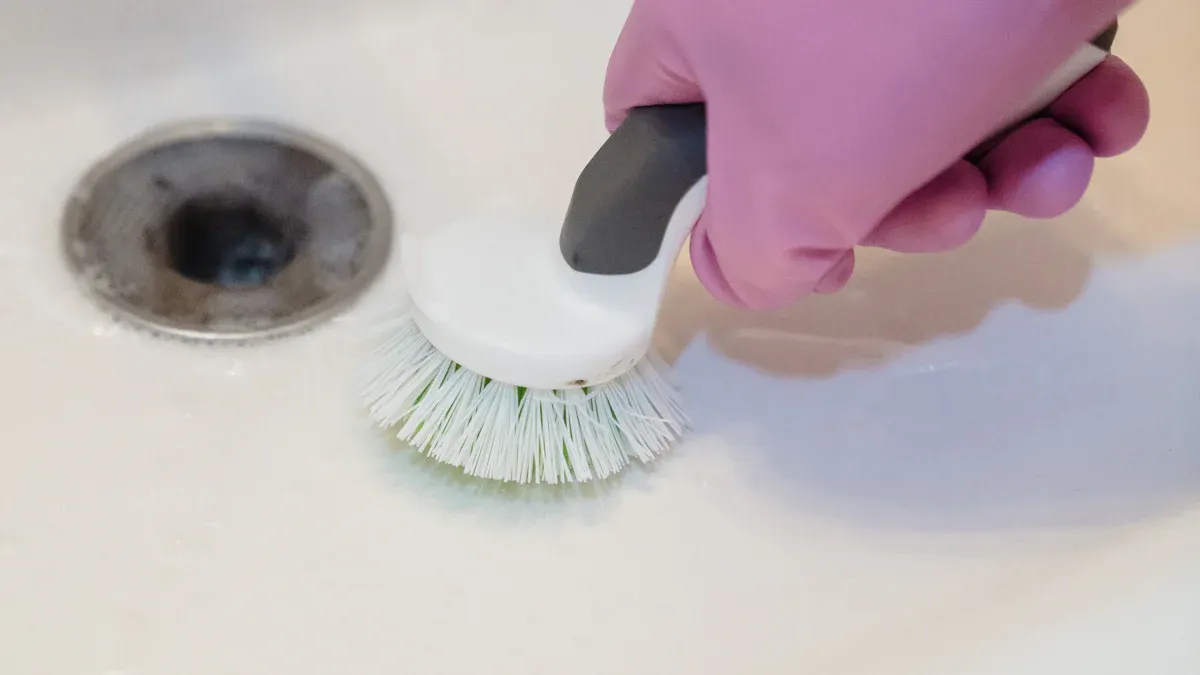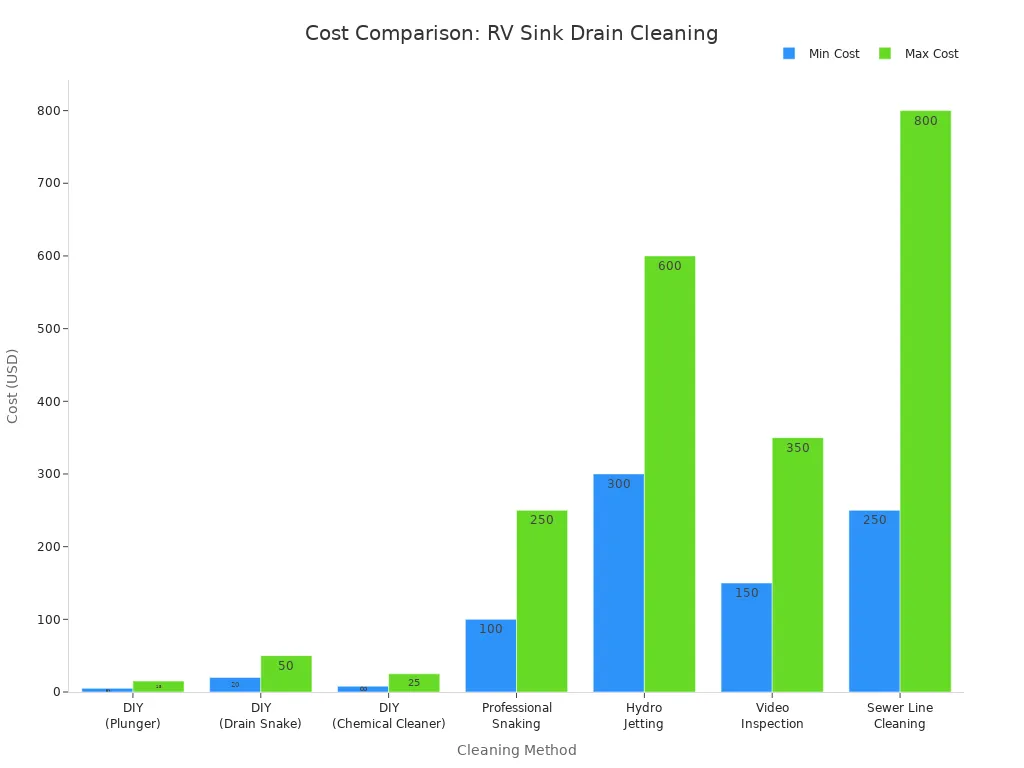Views: 0 Author: Site Editor Publish Time: 2025-09-16 Origin: Site
You can clean rv sink drains with baking soda, vinegar, and hot water. This method works well for light buildup, but tough clogs may need stronger solutions. Cleaning is safe and easy when you use gentle products. Quality fixtures, like those from Aquacubic, help your sink last longer. Regular care keeps odors and clogs away.
Use baking soda and vinegar to clean RV sink drains naturally. This method helps break down clogs without harming your pipes.
Regularly check for debris in your sink. Remove hair, food scraps, and soap scum to prevent clogs and keep your sink clean.
Install drain screens to catch debris before it enters your plumbing. This simple tool can save you time and effort in cleaning.
You need the right things before cleaning your RV sink drain. Here is a short list you should have ready:
Baking soda
Vinegar
Hot water
Plunger
Drain snake
Gloves
Bucket
These tools help with most cleaning jobs. Baking soda and vinegar clean drains naturally. They break down dirt but do not hurt pipes. Hot water washes away loose dirt. A plunger or drain snake helps with tough clogs. Gloves keep your hands safe. A bucket catches any spills.
Eco-friendly cleaners are good for your RV plumbing and nature. Do not use harsh chemicals. They can hurt water, soil, and your pipes. Try these products instead:
Drainbo Drain Treatment and Cleaner
Green Gobbler Enzyme Drain Cleaner
Clean Camper Probiotic RV Toilet Bowl Cleaner
Star brite Toilet Bowl Cleaner for RVs
Better Life Natural Toilet Bowl Cleaner
Thetford Premium Cleaner
These cleaners remove waste and stains without strong smells or bad chemicals. They break down in nature and are safe for septic systems. If you use them often, you can stop clogs and bad smells.
Sometimes, tough clogs need more help. A drain snake goes deep to pull out stuck dirt. A plunger pushes blockages away. Aquacubic sinks and faucets have smart features for easy care:
Feature | Description |
|---|---|
Exclusive ceramic material | Strong and lasts long in an RV |
Matte black finish | Stops rust and corrosion |
Hand-polished matte design | Keeps dust away and is easy to clean |
Scratch-resistant construction | Stops sharp things from causing damage |
Rounded corners and smooth surface | Makes cleaning and care easy |
With good tools and strong fixtures, your RV sink works well.

Start by checking your RV sink for any obvious debris. You might see hair, food scraps, or soap scum around the drain. These things often cause a clogged rv sink drain. Use gloves and pull out anything you can reach. If you see standing water, scoop it out with a cup or small bucket. This step makes it easier to clean rv sink drains and helps you spot bigger problems.
Common debris in RV sinks includes:
Hair buildup
Soap scum
Dirt and sand
Grease and food debris
Mineral deposits from hard water
A drain strainer can help catch hair and food before they go down the drain. Try to avoid rinsing dirt or sand into the sink. These simple habits make cleaning rv sink much easier.
Now you can use the baking soda and vinegar method. This is a safe way to clean rv sink drains and works well for most clogs. Pour about half a cup of baking soda into the drain. Next, add a cup of vinegar. You will hear fizzing and popping. That's the reaction breaking up the clog. Baking soda dissolves mineral deposits and organic materials. The bubbles attack fat, grease, and solidified oil. They also help dislodge food particles that cause a clogged rv kitchen sink.
Let the mixture sit for 15 to 20 minutes. This gives it time to work deep into the pipes. You can use this method as part of your regular cleaning methods to keep your rv sink clogged free.
Tip: The fizzing sound means the reaction is working. If you don't hear it, try adding a little more vinegar.
After the baking soda and vinegar have done their job, it's time for a hot water flush. Boil a kettle or heat water until it's very hot, but not boiling. Carefully pour the hot water down the drain. This step washes away loosened debris and helps clean rv sink drains completely. Hot water also melts grease and soap scum, which are common causes of a clogged rv kitchen sink.
If you notice slow drainage or water sitting in the sink, repeat the process. Sometimes, stubborn clogs need a second round.
If your rv sink clogged problem is still there, grab a plunger. Place it over the drain and make sure you get a tight seal. Push down and pull up quickly to create suction. This action can dislodge minor clogs and help clean rv sink drains fast.
Here's a quick look at how plungers compare to other cleaning methods:
Method | Effectiveness | Notes |
|---|---|---|
Plunger | Effective for minor clogs | Works best with a tight seal and strong suction. |
Baking soda & vinegar | Helpful in combination | Can boost the power of plunging. |
Snake/Auger | Best for stubborn clogs | Needed for tough or deep blockages. |
If you have a clogged rv kitchen sink, try plunging a few times. Sometimes, combining plunging with the baking soda and vinegar method gives the best results.
When a plunger doesn't fix the problem, use a drain snake. This tool goes deep into the pipe and breaks up tough clogs. Insert the snake into the drain and twist it gently. You might feel resistance if you hit a clog. Keep turning and pushing until the snake moves freely. Pull it out and clean off any debris.
A drain snake works well for a clogged rv sink drain that won't clear with other cleaning methods. It's also a good way to unclog an rv sink without using harsh chemicals.
If your rv sink clogged issue still won't go away, you may need to dismantle the trap under the sink. The trap is the curved pipe below the drain. Place a bucket underneath to catch water. Unscrew the trap and remove it. Clean out any debris inside. This step often solves a clogged rv kitchen sink or a clogged rv sink drain that nothing else can fix.
Note: If you feel unsure about taking apart plumbing, or if you keep having clogged drains, it's smart to call a professional. They have tools like hydro jetting and video inspection to find and fix deeper problems.

DIY methods like plungers and snakes cost less, but professionals can handle tough clogs and prevent future issues. Always use gentle, RV-safe cleaning methods to protect your plumbing. Avoid harsh chemicals that can damage pipes or seals.
By following these steps, you will know how to clean rv sink drains, keep your rv sink clogged free, and enjoy fresh-smelling, fast-draining sinks on every trip.
You want your RV sink to stay fresh and free from clogs. The best way is to clean sinks regularly and set up a routine. Flush your gray water tank with clean water often. Use enzyme-based treatments or tank cleaning solutions to break down waste. Rinse the tank after each trip. Check the valves and seals so everything works right. Empty the tank before it gets too full. Add water after each emptying to keep things moving. Try venting systems or tank deodorizers to stop bad smells. These steps help you avoid a clogged rv kitchen sink and keep your RV smelling nice.
Tip: Consistent cleaning keeps your rv sink clogged free and makes every trip more enjoyable.
You can prevent a clogged rv kitchen sink by watching what goes down the drain. Some things cause clogs fast. Here's a list of what to avoid:
Chemicals
Fabric scraps
Grease and oil
Hair
Non-degradable food
Soap residue
Grease and food scraps stick to pipes and lead to clogged drains. Hair and soap build up over time. Chemicals can damage your plumbing. If you keep these out, you'll see fewer rv sink clogged problems.
Drain screens make a big difference. They catch food, hair, and other debris before it enters your plumbing. This simple tool helps you avoid a clogged rv sink and slow drainage. You can find screens that fit Aquacubic sinks for extra style and protection. Aquacubic accessories look great and help you keep your sink clean. With drain screens, you spend less time fighting clogged rv kitchen sink issues.
Drain screens are easy to install and remove. You can clean them quickly and keep your RV sink working well.
You can keep your RV sink working well with a simple cleaning routine. Use cleaning solutions like baking soda and vinegar. Regular care helps you avoid clogs and odors. Quality fixtures from Aquacubic make cleaning easier. Try these tips:
Check for leaks and clogs often.
Use enzyme treatments to break down fat.
Fill tanks with water and let treatments sit.
Add dish soap to prevent buildup.
A checklist helps you remember each step. You will enjoy a fresh and clean rv sink every trip.
You should clean your RV sink drain every month. Regular cleaning keeps clogs and odors away. If you travel often, check it more frequently.
No, you should avoid regular drain cleaners. They can damage RV pipes. Use RV-safe or eco-friendly cleaners for best results.
Try flushing with hot water and baking soda. Check for trapped debris. Use an enzyme cleaner. If the smell stays, inspect the trap or call a professional.
